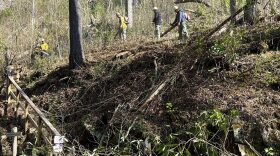-
Rep. Ted Davis has spent five years working on legislation that would make Chemours pay for PFAS-removing upgrades built by Southeastern NC utilities.
-
Several hundred people work in the Office of Research and Development at EPA's campus at Research Triangle Park. This office is being dissolved. Researchers will now move to different program offices.
-
Recreational fishing for the species is tightly regulated.
-
The Trump administration is expected to soon say whether it intends to stand by strict drinking water standards for forever chemicals set last year. The Environmental Protection Agency has said PFAS increases the risk of cardiovascular disease, certain cancers and babies being born with low birth weight.
-
As warm weather emerges in North Carolina, so do the snakes. A reptile expert tells us how to observe — and enjoy — snakes from afar. Then, an emergency medicine doctor tells us what to do if you’re bitten by a venomous snake: first, stay calm, and second, seek medical care.
-
Federal officials say two wildfires spreading in western North Carolina have burned more than 2 square miles of wooded area. The larger fire in the Joyce Kilmer-Slickrock Wilderness Area near Robbinsville has burned about 800 acres and was 0% contained on Wednesday.
-
Utilities in and around Wilmington have spent more than $240 million installing filters since learning of PFAS contamination in the Cape Fear River.
-
A 2008 tax bill omits solar farms from paying for 80% of the property tax on the value of their equipment. County governments and House Republicans want to strike that tax exemption.
-
Writer Georgann Eubanks chronicles fifteen natural phenomena from across the region in The Fabulous Ordinary: Discovering the Natural Wonders of the Wild South.
-
Co-host Leoneda Inge sits down with Susan Campbell, longtime hummingbird researcher and co-founder of the Cape Fear Bird Observatory.
-
Hiking the Pacific Crest Trail that runs through three western states is already challenging. Now the grueling journey may become even tougher this year due to federal cuts. Over a year's worth of trail work to clear downed trees and rebuild stretches of the Pacific Crest Trail has been canceled, while similar repairs have been disrupted for the Appalachian Trail. Wildfires and hurricanes already were taking a toll on America's two legendary trails that are used by millions each year. Now the associations overseeing the paths say cuts in grant money and the Trump administration's downsizing of the federal workforce threaten their very existence.
-
The Cape Fear River Basin is the source of drinking water for 1.5 million North Carolina residents. It is also where three municipal governments — Asheboro, Greensboro and Reidsville — are legally dumping dangerous levels of 1,4-dioxane, a colorless industrial solvent linked to cancer.















